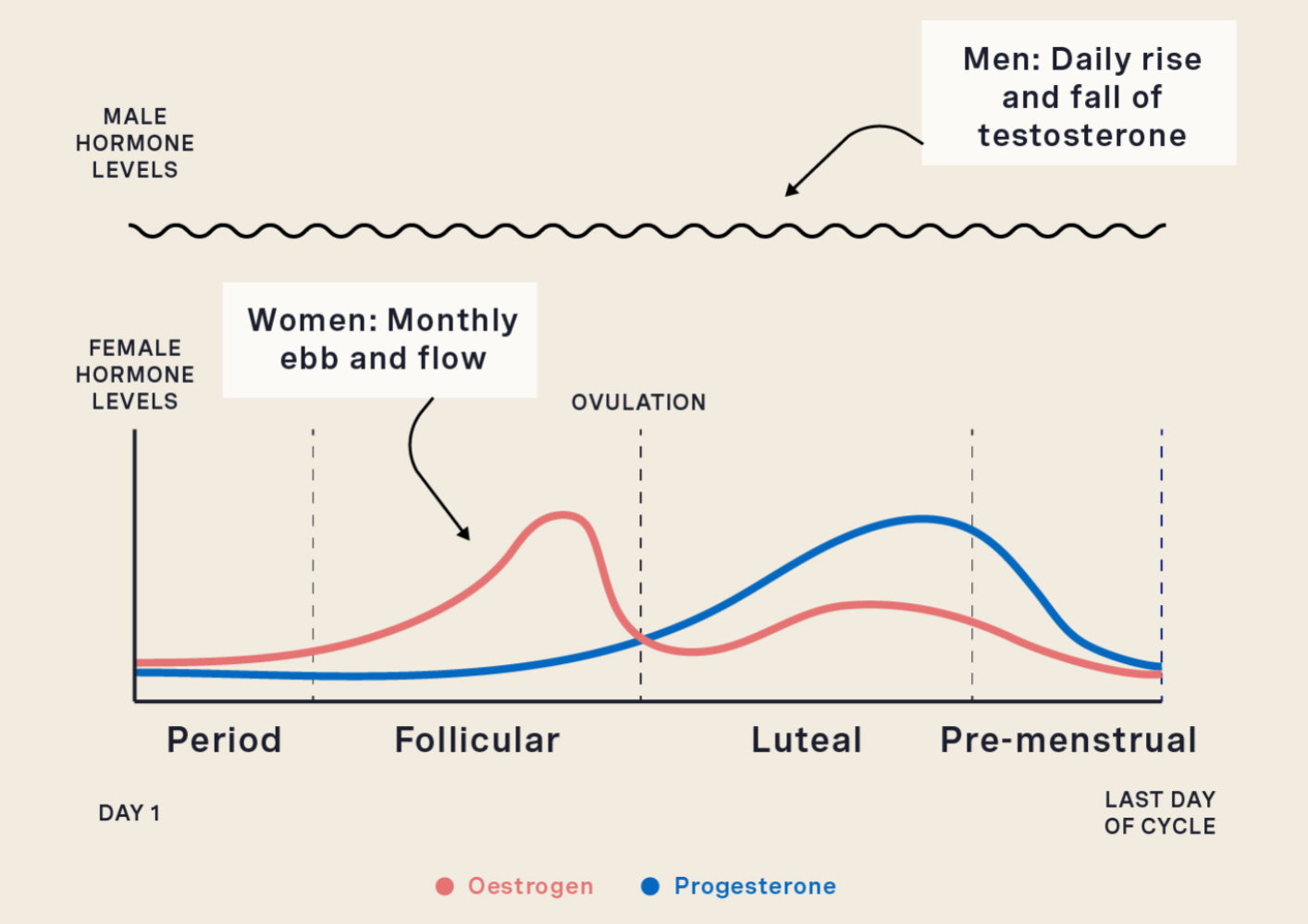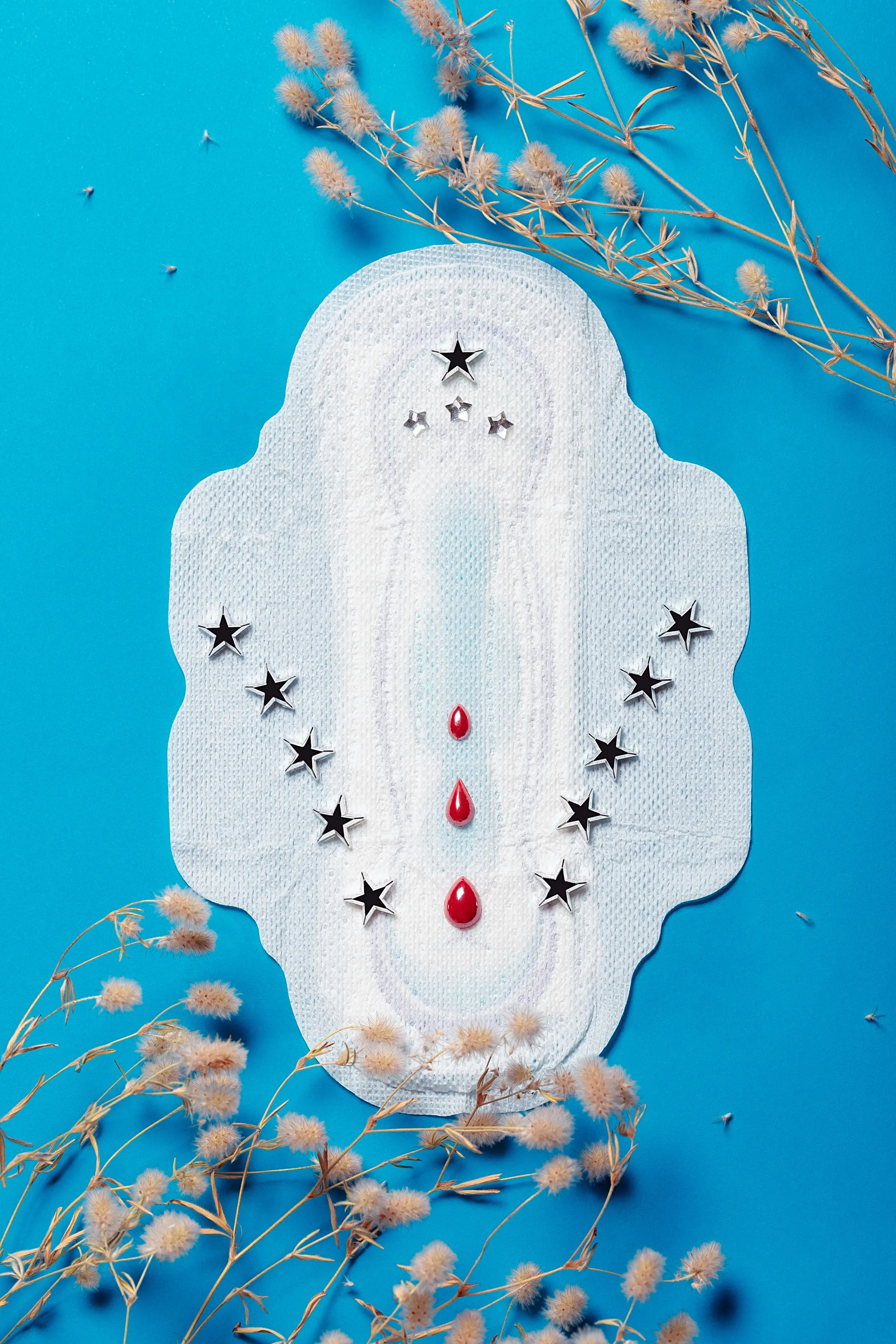If you’ve been following the last couple of articles on this mental health series I released (1 and 2), then you should already know:
🟣 The health and regularity of your menstrual cycle is deeply correlated to your emotional stability and positive outlook on life;
AND
🟣 Why ignoring and normalizing menstrual cycle symptoms like PMS and cramps, begins a snowball effect of worsening your mental health struggles as the months and years pass by!
Now that you have those 2 foundations in place, it’s time we get to the fun part.
The nitty-gritty of how to use your cycle to your advantage (always!).
Essentially, I want to show you that by following your menstrual cycle strengths while pursuing your life goals, you can:
⭐ feel so much more positive about yourself and gain the self-confidence you desire,
⭐ feel much more excited about your productivity work, and find yourself more naturally focused and achieveing goals faster without burning out!
Let’s start with WHY the way we're forced to integrate ourselves in the working industry, leaves women completely exhausted and feeling like they’re not good enough.
Societal systems are based on the 24-hour schedule we live by. Simply put, every day is a rinse-and-repeat of the day before.
And in case this is news to you, this a schedule that respects the male-hormonal cycle (which is mostly run by testosterone cycles).
The female-hormonal cycle (aka your menstrual cycle) is run on a 28-day cycle where many hormones are doing a beautiful dance of ups and downs so you can have a regular and symptom free cycle. Just look at the difference below. It's wild the difference between sexes.

And because of that, the female brain is going through a lot of different changes.
In fact, the ups and downs you see in the photo above can change our brain up to 25% throughout those 28 days of our mesntrual cycle. And for perspective, this is a HUGE amount of change you go through in a single month.
Image the 4 different seasons that nature goes through. Now condense all those changes in a time frame of 28 days. Do you understand now how much change your body is going through in such a small amount of time?
And when it comes to your brain, the 2 main hormones of your menstrual cycle (estrogen and progesterone) are flooding the brain at different moments in time, which makes different areas of your brain light up like christmas trees also at different times.
So, as a person, your emotional and cognitive strengths are literally changing week to week.
You are not the same person every week - (remember this!!)
So...why is it expected of us to feel, think and work exactly the same way every single day of the month when we're biogically primed to be productive and achieve results in a different way compared to men?
So it's super important we understand there is a cultural conditioning that limit us!
Cultural conditioning that keeps us in a robotic routine that diminishes our capabilities and our different geniuses.
Even though women are just as capable of doing and achieving the same things as men, it's the expectation that we need to immitate to get the same result that is the problem.
And this type of thinking is a HUGE problem, because women are NOT small men.
The very bad assumption that what works for men also works for women, is part of what got us into this epidemic of hormonal issues and mental health issues.
We can get to same exact result using two different methods.
When it comes to the conversation of productivity, there's a whole new paradigm we need to shift into.
And I call this: The New Model of Productivity for Women.
And this new model is based on the factual data we have about how the female brain works and how it is influenced by our hormonal cycle.
So today, I'm here to tell you that there is much better way for women to be productive and feel more accomplished in their lives.
🟣 Your menstrual cycle holds the key to you feeling more accomplished.
When you try to stick to the same habits every day to attempt to accomplish all you had planned out for the week, instead of feeling like you are breezing through your to-do list, you start feeling worse about yourself because you can’t seem to stick to it.
And the more you try to behave this way, the more stressed you become, and the less satisfied you feel with yourself. This opens up the gates for low confidence and negative thoughts about yourself (and that's a place you definetely don't want to be).
I see it day in and day out.
My clients come to me with deep-rooted beliefs that something is wrong with them.
“I am a failure”.
“I can’t keep my commitments to myself.”
They get into a spiral of bad feelings about themselves, simply because…they have been operating with the wrong operating system.
An operating system that serve people with male hormones, but not people with female hormones.
So, no. There’s nothing wrong with you.
- You are not a failure.
- And you don’t have problems with commitment or being disciplined.
Quite the contrary.
You just weren’t aware or factoring in the changes in your natural hormonal rhythms so you can actually be dependable on your energy levels and focus.
So...
How can you Put Your Menstrual Cycle to Work for You?
1. First, remember, you’re not the same from week to week. So stop expecting to work that way.
2. Second, understand that your hormones can affect more than just your period.
- They can significantly affect the way you think, feel, work, and relate to others.
- They can affect what you are interested in and what you are stimulated by each week of your cycle.
What you need to do first is:
--> Learn about how your hormone fluctuations influence your behavior (I walk you through below).
--> Then, commit to notice these shifts as you move from week to week (best way to notice is to use an app that shows you your different menstrual phases, so you can connect with your body and analyse).
- I reccomend the app MyFlo - extremely easy to use, and helps stay really in tune wth your cycle.
--> Finally, start experimenting with different ways to schedule your weekly work and goals, so that your cycle strengths can help you sustain your energy, creativity, and productivity regardless of the demands on your schedule.
When you start working smarter this way, those negative limiting beliefs you’ve been holding onto start to dissipate. This is because you no longer have proof that you aren’t good enough and that you can’t do things with ease and less resistance.
It’s a magical process of seeing your brilliance come out.
So let’s get into the juicy part.
Here’s how you can start to schedule tasks/goals to appropriate phases of your cycle.
🟣Follicular phase
This phase begins on the first day after you bleed.
Hormonally speaking, your estrogen levels are starting to rise, after being at an all-time low during the bleeding week.
Interestingly, estrogen’s effect on your brain improves your ability to solve problems, strategize, and plan – meaning, you have more mental sharpness.
But it also sparks creativity.
So, this makes the follicular phase an ideal time to:
1. Schedule your most mentally challenging assignments for this week.
2. It’s also an ideal time to start working on something new. Something that you’ve always wanted to do. Anything from a new project to a new business.
When you schedule things this way, the task at hand will feel like it’s flying by, because you are taking full advantage of the cognitive capabilities you need strengthened for those types of tasks – which are your brain’s creative power as well as its problem-solving capabilities.
However, as I mentioned before, don’t forget that you are capable of doing this at any other time in your cycle. But the difference will be, that instead of taking 2x as long to do the job, it will feel like it’s flying by, and you will preserve a lot more energy, rather than wasting it because you have to force something out - you get to work smarter, not harder.
🟣 Ovulatory phase
As you get closer to the ovulatory phase, estrogen levels start flooding your brain even more.
This not only heightens the skills mentioned before but estrogen also activates a special part of your brain.
The part that makes you extra social, communicative, and confident.
- Both the verbal and social centers of your brain are lighting up like fireworks.
This means that in this phase, you will get energized by doing tasks that involve connection and collaboration:
- like networking, social gatherings, client meetings, and presentations (and a tip for the single outthere...dating!).
Choosing to have important conversations at this phase, such as asking for a promotion, will feel easier.
- This is because you’re a very clear communicator and you’re also a great listener because you are generally more receptive listener as well.
For all the entrepreneurs out there, this is a great time to batch marketing content such as reels, recording videos, going live, etc. It will feel so much easier to do it in this phase and you will not feel exhausted by the task.
🟣 Luteal phase
Most of us think about the luteal phase, as the phase where we will be struggling with PMS.
But the luteal phase is meant to be a wonderful experience when your hormones are regulated.
Because in this phase, progesterone levels start rising.
--> And high progesterone levels in the brain provide us with a calming and focusing effect on our productivity.
Interestingly, the particular ratio of estrogen to progesterone in this phase makes you notice things around you that you didn’t see before.
--> As a result, your brain begins to prioritize detail-driven responsibilities that seemed dreadful to you in any other week.
It will feel pleasurable and effortless for you to sit down and get things done because you have less social energy and you are very observant of detail.
- Get those reports and Excel sheets done, finalize your editing and proofreading, and get your finances together (remember...anything with minute detail will be easier for you to deal with).
🟣 Menstrual Phase
This phase is extra special because your cycle is giving you the opportunity to deeply assess your life and how it’s going.
You are great at evaluating and analyzing what is going on in your life.
Use this time of the month to reassess your progress and goals.
You’re also most likely to receive clear intuitive-gut messages during this phase.
- So make sure to check in and listen to those subtle messages. Because they will hold your truest feelings.
- Use your journal or planner to jot down what your gut is telling you each month at this time and start comparing what comes up month after month.
You may find that after a few months go by, your intuition during this phase is reinforcing certain thoughts you’ve had in general.
So by tuning in and trusting your instincts, you can then take action in the next set of phases of your cycle to work towards your vision and goals.
The aftermath of syncing with your cycle on your mental health
After syncing your work routines with your cycle for a few months, you will hopefully start noticing positive shifts in your moods and your energy levels.
Instead of feeling like you’re grinding away, having anxious and depressive thoughts about your capabilities, you will get more excited about getting things done in your day-to-day.
This will also change the way you feel when you wake up in the morning. You may experience more willpower, less stress, and less overwhelm.
With this cycle-based practice, you’re also inviting yourself to connect deeper with your body.
- This will inadvertently make you notice its different needs and desires throughout the monthly cycle.
- And when you act on those needs, you are supporting the health of your hormones, the health of your cycle, and consequently the health of your emotional well-being.
See it this way, every time you can match a task to the right timing of your biochemistry, you are no longer draining your energy bank account. And your energy bank directly influences the levels of stress and anxiety you experience in life.
You will also have more fun.
Life will feel more pleasurable.
And you will look forward to doing all the things, instead of it feeling like a drag.
Have fun experimenting!
Much love,
Dr. Maria – your go-to doc for happy hormones
Resources:
Vitti, A. 2020, Flo Living, HarperCollins, New York.
McEwen B. Estrogen actions throughout the brain. Recent Prog Horm Res. 2002;57:357–84.
Reynolds TA, Makhanova A, Marcinkowska UM, Jasienska G, McNulty JK, Eckel LA, et al. Progesterone and women’s anxiety across the menstrual cycle. Horm Behav. 2018 Jun;102:34–40.
Wharton W, Gleason CE, Olson SRMS, Carlsson CM, Asthana S. Neurobiological Underpinnings of the Estrogen – Mood Relationship. Curr Psychiatry Rev. 2012 Aug 1;8(3):247–56.
Vitti, A. 2013, WomanCode, HarperOne, New York.
What you can read next...

